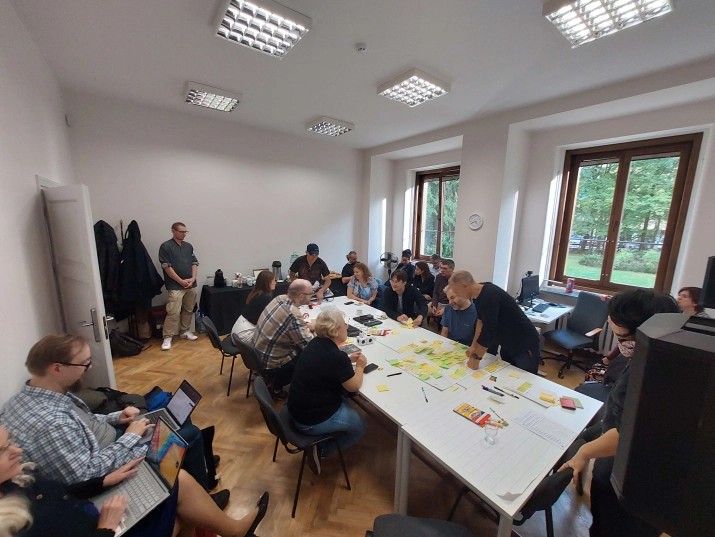The GRADE International Workshop was held on September 26-27, 2024, at “The House of Scientists” in Vilnius, Lithuania. This event brought together scholars and practitioners to explore critical themes in digital culture and education, particularly focusing on creative computing and user privacy.
Day 1: Thursday, September 26
The workshop commenced with registration and a welcome coffee at 09:30. After the opening session, participants engaged in various discussions during the first session, which focused on two main topics:
– Open Educational Materials: Exploring the intersection of creative computing and circular economy.
– Hybrid Exhibition: Showcasing media formats across borders before and after the Iron Curtain, emphasizing dissemination strategies.
– Privacy White Paper: Addressing grassroots practices to tackle user privacy issues related to creative computing.
After a lunch break, the afternoon sessions continued with the same topics, allowing for in-depth discussions. The day concluded with a closing session summarizing key insights and reflections.
Day 2: Friday, September 27
The second day began similarly with registration and welcome coffee, followed by a Core Group meeting. Participants again divided into groups for in-depth discussions on:
– Open Educational Materials and their relevance to the circular economy.
– Privacy White Paper discussions continued, along with the hybrid exhibition discussions.
After lunch, a financial Q&A session with Sirpa Saariaho provided attendees with valuable insights into funding and financial strategies. The workshop concluded with reflections on the event and discussions about next steps for the GRADE initiative.
The GRADE International Workshop facilitated rich dialogue and collaboration among participants, highlighting the importance of grassroots practices in digital culture and education. The event not only showcased innovative research but also emphasized the need for ongoing discussion and cooperation in addressing contemporary challenges in creative computing and user privacy.
Day 1: Thursday, September 26
The workshop commenced with registration and a welcome coffee at 09:30. After the opening session, participants engaged in various discussions during the first session, which focused on two main topics:
– Open Educational Materials: Exploring the intersection of creative computing and circular economy.
– Hybrid Exhibition: Showcasing media formats across borders before and after the Iron Curtain, emphasizing dissemination strategies.
– Privacy White Paper: Addressing grassroots practices to tackle user privacy issues related to creative computing.
After a lunch break, the afternoon sessions continued with the same topics, allowing for in-depth discussions. The day concluded with a closing session summarizing key insights and reflections.
Day 2: Friday, September 27
The second day began similarly with registration and welcome coffee, followed by a Core Group meeting. Participants again divided into groups for in-depth discussions on:
– Open Educational Materials and their relevance to the circular economy.
– Privacy White Paper discussions continued, along with the hybrid exhibition discussions.
After lunch, a financial Q&A session with Sirpa Saariaho provided attendees with valuable insights into funding and financial strategies. The workshop concluded with reflections on the event and discussions about next steps for the GRADE initiative.
The GRADE International Workshop facilitated rich dialogue and collaboration among participants, highlighting the importance of grassroots practices in digital culture and education. The event not only showcased innovative research but also emphasized the need for ongoing discussion and cooperation in addressing contemporary challenges in creative computing and user privacy.

